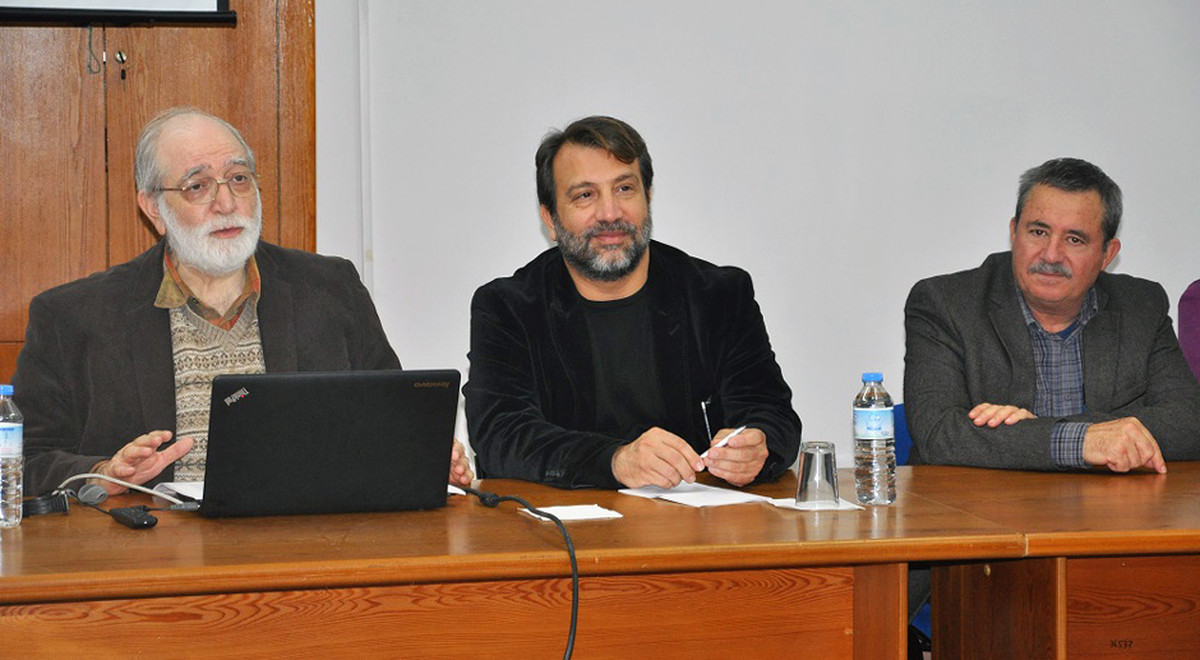Cyprus Policy Center organised its third seminar at the department of Political Science and International Relations on the 7th of January. The seminar was entitled The Intercommunal Negotiations in Cyprus: Searching for Two One-Sided ‘Just’ Solution. The opening speech was delivered by Vice-Rector for Academic Affairs Prof. Dr. Ahmet Sözen, who also introduced the guest speaker of the event, Dr. Zenon Stavrinides.
Dr. Zenon Stavrinides, who was born in Cyprus, studied Philosophy at King’s College London. Then, he continued his education in International Relations at the University of Cambridge and gained a PhD in Philosophy from the University of Leeds. He thought Philosophy, Political Theory and Medical Ethics in a number of British academic institutions. He also worked in the field of print journalism and broadcasting. Dr. Stavrinides is a founding member and General Secretary of the Association for Cypriot Greek and Turkish Affairs, a UK based organization working for the development and dissemination of understanding of social, political and economic developments in Cyprus, Greece and Turkey. He has a publication called ‘’ The Cyprus Conflict: National Identity and Statehood’’ which focuses on history of philosophy, epistemology, and human rights, as well as the Cyprus Problem.Dr. Stavrinides is one of the experts in ongoing Cyprus problem.
Dr. Zenon Stavrinides started the seminar by talking about what actually the Cyprus problem is. He stated that first we need to understand the problem and only then will we able to find a solution.
Dr. Zenon Stavrinides put forth that from 1974 to 2005, Cyprus problem wasn’t solved by war or arbitration. He reminded that for almost 50 years, the Cyprus Problem has been existent but no settlement turned out to be an achievement. The Annan Plan could have been an achievement but it was rejected by majority of Greeks. Many negotiations were held but none of them brought any certain solution. According to Dr. Stavrinides’ views, there are two important things that may change the fate of the Cyprus Problem: Changing character of negotiations and putting forward to promote two sides’ interests. Dr. Stavrinides stated that if these two things change, the Cyprus Problem will be solved eventually. He supported this recommendation with some reasons. First of all, he analyzed the understanding of Greek Cypriots and Turkish Cypriots on the historical background of the Cyprus issue. He told us that Greek Cypriots mainly talk about 1974. At that time Turkey made invasion, troops came to Island, many people died in the war. On the other side, Turkish Cypriots talk about 1963 events. Dr. Stavrinides added that Turkish Cypriots are sad since they lost their rights and freedom, they lived in misery and poverty. Thus, 1974 intervention was a rescue for them. He concluded that both sides have memories about past but their demands are same: they want a just settlement, rights, advantages and benefits should be restored. In addition, Turkish Cypriots want recognition of position in international area.
Another issue was brought by Dr. Zenon was the conception of negotiations. Negotiations are made by elected leaders in both sides. Leaders tell their citizens that they will struggle for their citizens. However, character of leaders affects the process. They can be maximalist or modernist. Maximalist is against the revision of history, but modernist is positive to reach a solution. As Dr. Stavrinides stated that Hristofias was a modernist who made some progress and reached an agreement with Turkey at that time.
Lastly, Dr. Stavrinides talked about what can be done to solve Cyprus problem. He believes there will be no war in the coming years. War will not solve issue. He suggested that people can get to the point of accepting their fate and can say ‘This is our fate and we will beat it with our dignity’. Moreover, certain indications can be changed, but sure they are not enough. First, Greek Cypriots should trust to politicians. Second, history books should be changed. Third, during the past 10 years, an increasing number of bi-communal groups, cooperation, meetings and friendships have gained importance. As Dr. Stavrinides believes technocrats have importance in developing projects and showing a possible way to collaborate together. With these changes, the Cyprus problem will be solved eventually and the solution will be trustable, just and fair for two sides on the island.

